Unit 7 Will people have robots? Section A(Grammar+Focus-3c)课件(共42张PPT)
文档属性
| 名称 | Unit 7 Will people have robots? Section A(Grammar+Focus-3c)课件(共42张PPT) |
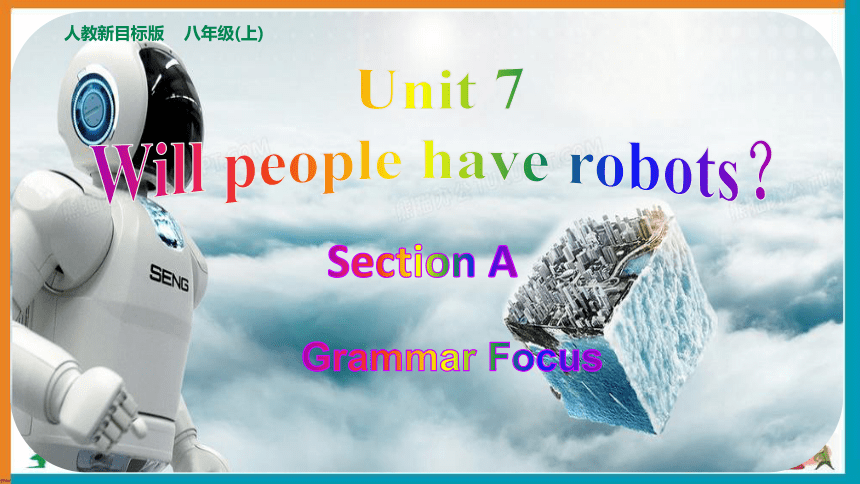
|
|
| 格式 | pptx | ||
| 文件大小 | 6.2MB | ||
| 资源类型 | 教案 | ||
| 版本资源 | 人教新目标(Go for it)版 | ||
| 科目 | 英语 | ||
| 更新时间 | 2023-10-08 00:00:00 | ||
图片预览

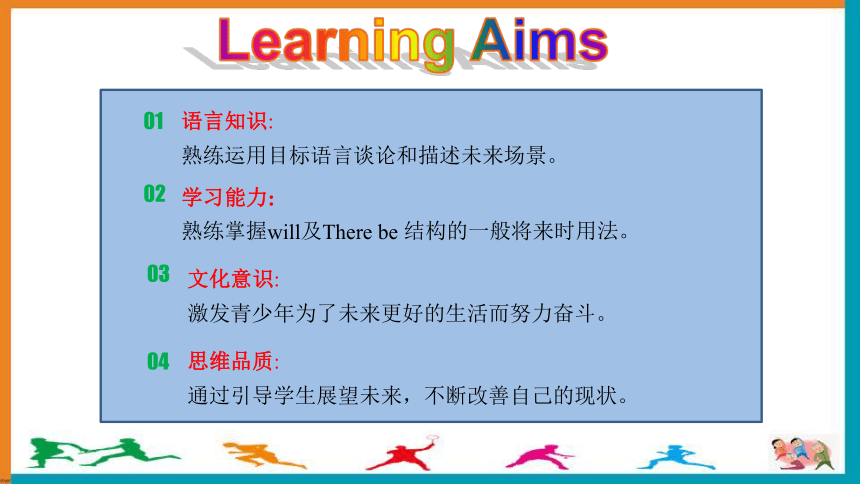
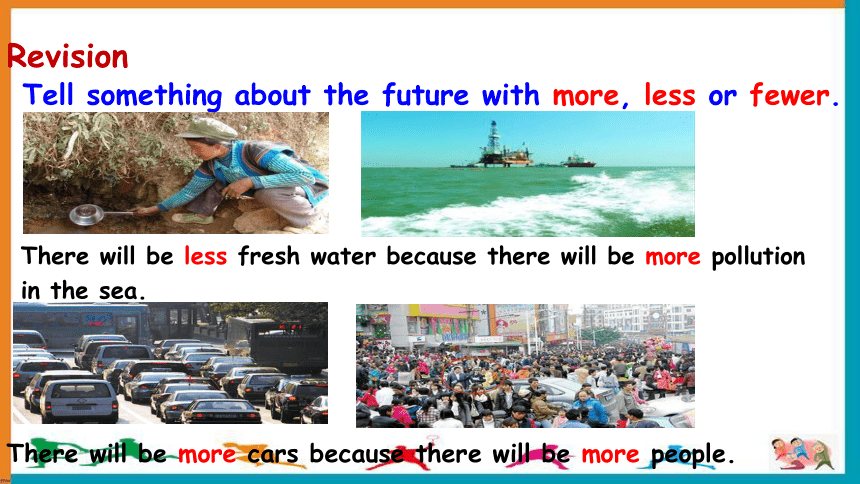
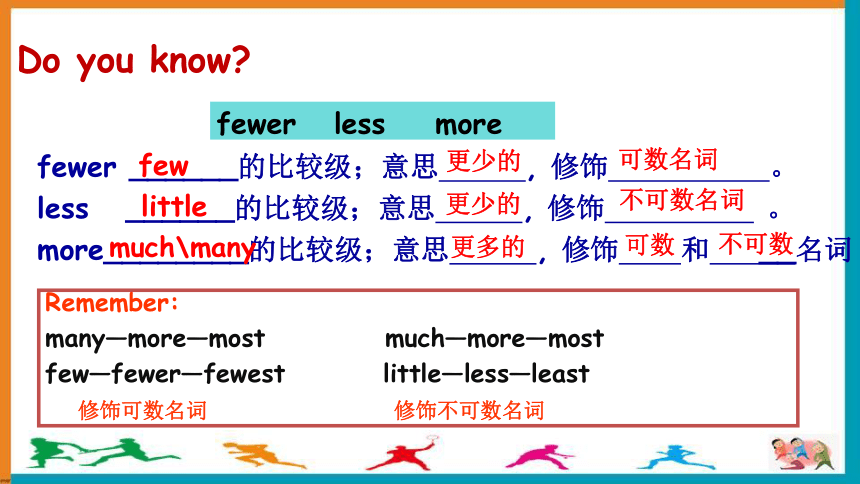
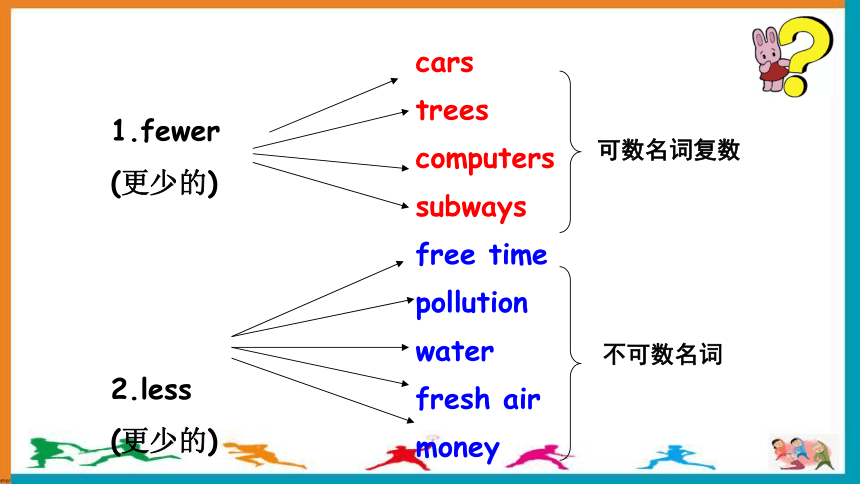
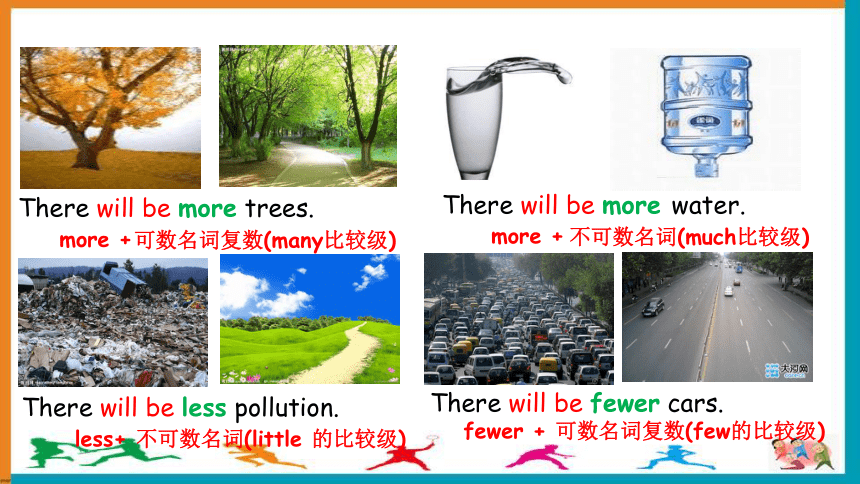
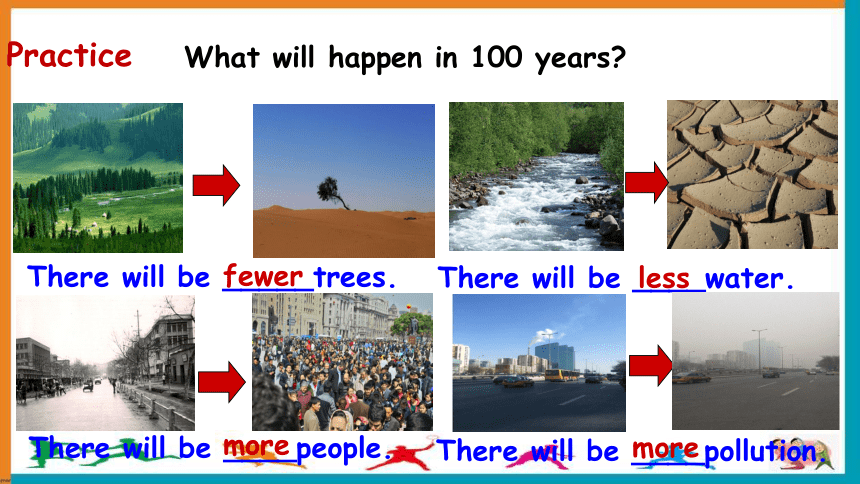

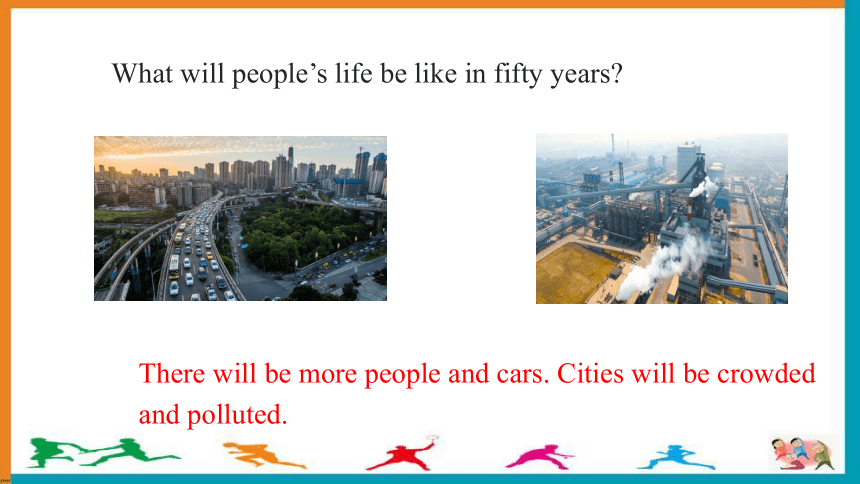
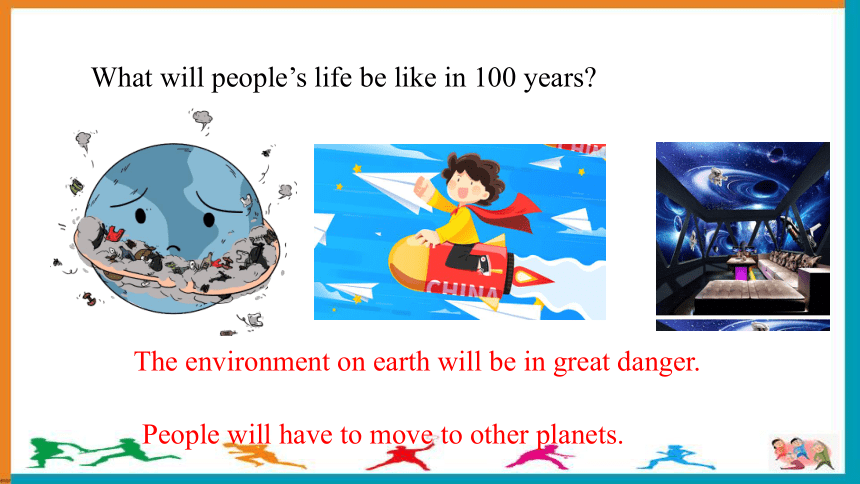
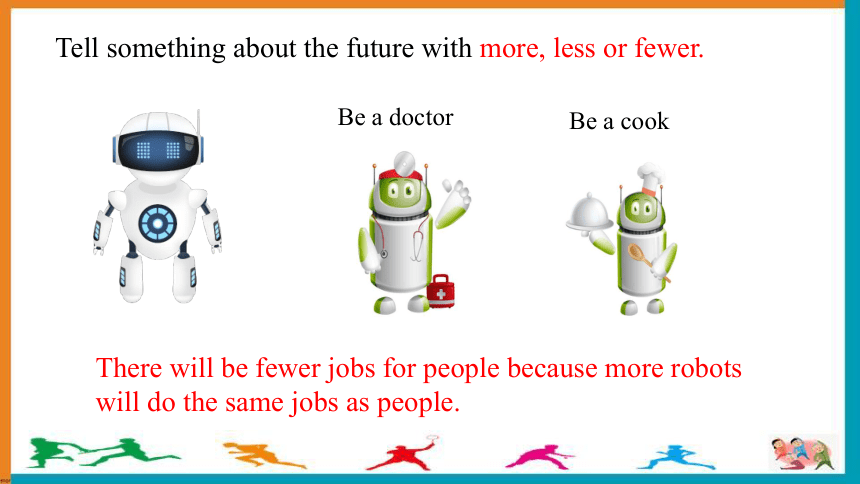
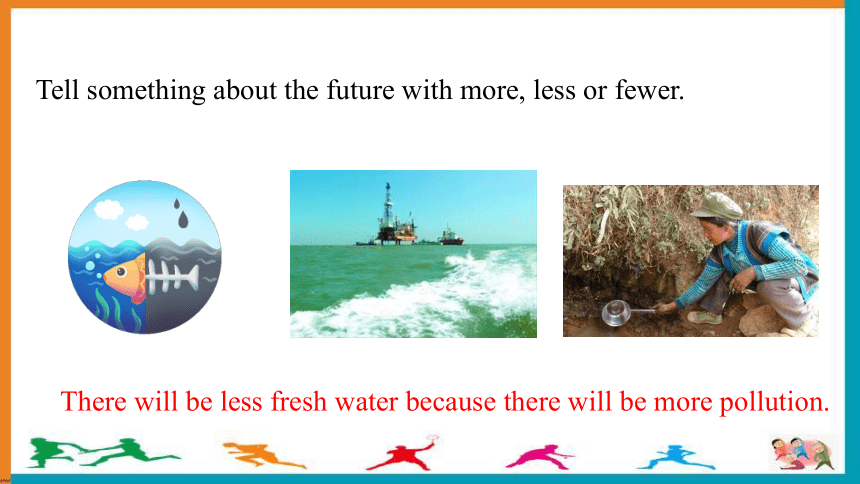
文档简介
(共42张PPT)
Section A
Grammar Focus
Unit 7
Will people have robots?
人教新目标版 八年级(上)
Learning Aims
文化意识:
激发青少年为了未来更好的生活而努力奋斗。
思维品质:
通过引导学生展望未来,不断改善自己的现状。
学习能力:
熟练掌握will及There be 结构的一般将来时用法。
语言知识:
熟练运用目标语言谈论和描述未来场景。
03
04
02
01
Tell something about the future with more, less or fewer.
There will be less fresh water because there will be more pollution in the sea.
There will be more cars because there will be more people.
Revision
fewer less more
fewer ______的比较级;意思 , 修饰 。
less ______的比较级;意思 , 修饰 。
more________的比较级;意思 , 修饰 和 __名词
Remember:
many—more—most much—more—most
few—fewer—fewest little—less—least
修饰可数名词 修饰不可数名词
Do you know
更少的
更少的
更多的
few
little
much\many
可数名词
不可数名词
可数
不可数
1.fewer
(更少的)
2.less
(更少的)
cars
trees
computers
subways
free time
pollution
water
fresh air
money
可数名词复数
不可数名词
There will be more trees.
There will be more water.
more +
可数名词复数(many比较级)
more +
不可数名词(much比较级)
There will be less pollution.
There will be fewer cars.
less+ 不可数名词(little 的比较级)
fewer + 可数名词复数(few的比较级)
What will happen in 100 years
There will be _____trees.
There will be ____water.
There will be ____people.
There will be ____pollution.
Practice
fewer
less
more
more
What will your life be like in ten years
I’ll be an engineer.
I’ll go to Sydney on vacation.
There will be more people and cars. Cities will be crowded and polluted.
What will people’s life be like in fifty years
People will have to move to other planets.
The environment on earth will be in great danger.
What will people’s life be like in 100 years
Be a doctor
Be a cook
Tell something about the future with more, less or fewer.
There will be fewer jobs for people because more robots will do the same jobs as people.
There will be less fresh water because there will be more pollution.
Tell something about the future with more, less or fewer.
There will be more cities because people will build more buildings in the country.
Tell something about the future with more, less or fewer.
What will the future be like Cities will be more polluted. And there will be fewer trees.
Will people use money in 100 years No, they won’t. Everything will be free.
Will there be world peace Yes, I hope so.
Kids will study at home on computers. They won’t go to school.
Grammar Focus
Countable nouns Uncountable nouns
There will be more people. There will be fewer trees. There will be more pollution.
There will be less free time.
1. 未来将会是什么样子?What ____ the future ____ ____
2. 城市将会有更多的污染.将会有更少的树子。
Cities ____ ___ ___ polluted. And there will ____ ____ trees.
3. 一百年后人们还使用钱吗?
_____ people _____ money____ 100 years
4. 不,不用了。一切都将是免费的。 No,____ ____ .Everything___ ___ free.
5. 世界将会和平吗?是的,我希望如此。
___there ___world_____ Yes ,I ___ so
6. 孩子们将在家里通过电脑学习。
kids ______ _____ ______ home _____ computer.
7. 他们不会去上学? They _____ ______ to school
8. 将会有更多的人,更少的空闲时间。
There ____ ____ ____ people and_____ free time.
be like
will be more
Will use in
根据课本内容,完成下列句子。
they won’t will be
will
be fewer
Will be peace hope
will study at on
won’t go
will be more less
一般将来时(二)
语法讲解
一般将来时表示将来某个时间要发生的动作或存在的状态,也表示将来经常或反复发生的动作,常与表示将来的时间状语连用,如tomorrow,next week,next year,in the future等。
一般将来时will
一般将来时由“助动词will+动词原形”构成,表示将来某个时间要发生的动作或存在的状态,也表示将来经常或反复发生的动作。一般将来时常与表示将来的时间状语连用,如:tomorrow, soon, next year, in three days, in the future等。
肯定句:主语+will+动词原形+……。如:
We will visit the Moon tomorrow. 明天我们将到访月球。
“主语+will”常用缩略形式:
I will = I’ll, you will = you’ll, he will = he’ll, she will = she’ll,
it will = it’ll, we will = we’ll, they will = they’ll
The simple future tense (will)
否定句:主语+will + not+动词原形+……。如:
She will not come to my party. 她不会来参加我的聚会。
It will not be very hot this summer. 这个夏天将不会很热。
will not 常用其缩略形式 won’t。
一般疑问句:Will+主语+动词原形+……?如:
— Will there be less pollution in the future
将来的污染会更少吗?
— Yes, there will. 是的,会更少。
/ No, there will not. 不,不会更少。
特殊疑问句:疑问词+will+主语+动词原形+……?如:
— When will you go to Shanghai
你什么时候去上海?
— Next Monday. 下周一。
— What will you do tomorrow 你明天做什么?
— I’ll play football with my friends.
我会跟朋友一起踢足球。
B 一般将来时be going to
对于将要发生的事情,或打算、计划、决定要做的事情,都可以用“be going to+动词原形+……”的句型来表示。
肯定句:主语+be going to+动词原形+……。如:
I am going to play basketball after school.
我打算放学后打篮球。
Jim is going to take a trip this weekend.
吉姆计划这个周末去旅行。
否定句:主语+be not going to+动词原形+……。如:
I’m not going to be a doctor. 我不打算当医生。
一般疑问句:Be+主语+going to+动词原形+……?如:
— Are you going to be a teacher when you grow up
你想长大了当一名教师吗?
— Yes, I am. 是的,我想。/ No, I’m not. 不,我不想。
特殊疑问句:疑问词+be+主语+going to+动词原形+……?如:
How are they going to spend their holidays
假期他们准备怎么过?
— What are you going to do next Saturday
下星期六你打算干什么?
— I’m going to go swimming. 我打算去游泳。
be going to +V. 原 will+V.原
近期、眼下要发生的事 将来时间较远
主观判断将来肯定发生的事 客观上将要发生的事
有“计划、准备”的意思 没有“计划、准备”的意思
区别
will + 动词原形 表示没有事先准备或计划的 事情 表明说话者的主
观意愿或客观上
势必会发生的事
be going to + 动词原形 表示事先考虑好或按计划会发生的事 有迹象表明要发
生某事情
2. “will+动词原形”与“be going to+动词
原形” 的区别:
一般将来时的肯定式、否定式和疑问式如下:(以go为例)
人称 肯定式 否定式 疑问式
第一人称 I/We will/shall go. I/We will/shall not go. Shall/Will I/we go
第二人称 You will go. You will not go. Will you go?
第三人称 He/She/It/They will go. He/She/It/They will not go. Will he/she/it/they go?
构成:助动词shall/will+动词原形
3a Fill in the blanks with more, less or fewer.
In the future, there will be _______fresh water because there will be_______ pollution in the sea.
2. In 100 years, there will be_______ cars because there will be ________ people in the cities.
more
less
more
more
3. There will be_______ jobs for people because_______ robots will do the same jobs as people.
4. I think there will be______ cities because
people will build_______ buildings in the country.
5. In 50 years, people will have ______free time because there will be_____things to do.
fewer
more
less
more
less
more
3b Complete the predictions with what you
think will happen.
Kids study at school now. In 100 years,
___________________________________
2. I sometimes see blue skies in my city, but
in the future _______________________
__________________________________
Kids will study at home on computers
I will often see the blue skies,
because there will be less pollution.
4. Families usually spend time together on
weekends, but maybe in 200 years______
___________________________________
___________________________________
3. People now usually live to be about 70-80
years old, but in the future
____________________________________
People will live to be 200 years pld.
Everyday can be weekend, because
they have robots to do everything.
I think there will be more tall buildings, and there will be fewer cars and more buses.
3c Draw a picture of what you think a city in
the future will be like. Then describe it to
the class.
Group work
我都 学会了!
本课句型
Summary
The Simple Future Tense.
There will be …
The usage of “more, less, fewer”
Grammar Focus
总结一
will +动词原形
以上句子的时态叫”一般将来时”,一般将来时表示将来发生的动作或情况,
其基本结构是_______________.
肯定句:主语+____________+(宾语)+其他成分 People will have robots in their homes.
will +动词原形
否定句:在will 的后面加_____即可。
not
will not =
won’t
People will not (=won’t) have robots in their homes.
一般疑问句:把_______提到句子主语之前,结尾变问号.
will
Will people have robots in their homes
Yes , they will .\No , they won’t .
特殊疑问句:__________+一般疑问句? What will you do tonight
特殊疑问词
一般将来时常与表示将来的时间状语连用,如________________, _________________,_________________等。
in ten years
next week
tomorrow
There be 句型的一般将来时
①肯定形式:_________________________
②否定形式:___________________________
③一般疑问句式:____________________________
肯定回答:_________________________________
否定回答:_________________________________
There will be + 动词原形 +其它.
There will be+ not + 动词原形 + 其它.
Will there be + 动词原形 + 其它
Yes , there will be .
No , there won’t be .
There will be fewer trees.
There won’t be more paper.
Will there be more people
1. 将会有更多的人口。_________________________________
2. 100年后将不会有钱币。______________________________
There will be more people.
There won’t be any money in 100 years.
总结二
Grammar Focus
fewer
更少的
less
不可数名词
更少的
more
可数 / 不可数名词
few的比较级为_________,+____________意思为_________
little的比较级为________,+____________意思为_______
much\many的比较级_____,+______________意思为__________
1.There will be____________(更多的建筑)in 50 years.
2.The students will have_____________(更少的家庭作业)to do.
3.There will be_____________(更少的污染)here.
4.Kids will have______________(更多的计算机)in their classroom.
5.There will be______________(更多的图书馆)in this city.
6.There will be______________(更少的树)in the park.
可数名词复数
更多的
more buildings
less homework
less pollution
more computers
more libraries
fewer trees
总结三
Exercises
一、单项选择。
1. We will have ____ free time because the robots will work for us.
A.less B.more C.fewer D.most
2. —________ will your mother come back
—In two days.
A.How soon B.How many C.How long D.How often
3. You will ________ take a holiday after the test.
A.can B.could C.be able to D.are able to
A
B
C
4. — They will ________ a lot of trees on the mountain.
— Wow, sounds great.
A.planet B.plant C.plan D.plane
5. — ________ a new film next week.
— Really I will go to watch it.
A.There is B.There will have
C.There will be D.There is going to have
B
C
( )6. There ____ a tiger show in the zoo tomorrow evening.
A. was B. is going to have
C. will have D. is going to be
( )7. I ____ you a nice present on your next birthday.
A. gave B. will give C. gives D. give
( )8. We ____ a meeting in an hour.
A. have B. will have C. has D. would have
D
B
B
Where ______ you ____(live) five years ago?
--I _____ (live) in Changsha.
2. He ______(be) a teacher after he left college.
3. Now he ____ (have) lots of free time, but he _______ (have) less free time in ten years.
4. There ______(be) fewer children in people’s home in 10 years.
5. —— _____ they ____ (play) football after school next Monday
—— No, they _____.
lived
did live
was
has
will have
will be
Will play
won’t
二、用所给词的正确形式填空。
6.They _________ (have)any classes next week.
7.Betty _________ (write)to her parents tomorrow.
8.Look at those clouds. It _________(rain).
9.He _________ (read)an English book now.
10.Look! Many girls ___________ (dance )over there.
won't have
will write
will rain
is reading
are dancing
三、按要求改写句子。
1 I will call you this evening. (改为否定句)
2 Sally won’t visit the Great Wall tomorrow. (改为肯定句)
3 He will have time to watch TV. (改为一般疑问句)
4 Will Lucy go to the cinema this weekend (作肯定、否定回答)
I won’t call you this evening.
Sally will visit the Great Wall tomorrow.
Will he have time to watch TV
Yes, she will. / No, she won’t.
四、句子翻译。
1 我们下周一离开广州。
2 你明天会去看他吗?
3 他们没打算下周去野炊。
4 汤姆下周三回来。
5 你们打算什么时候去放风筝?
We’ll leave Guangzhou next Monday.
/ We’re going to leave Guangzhou next Monday.
Will you go to see him tomorrow / Are you going to see him tomorrow
They won’t have a picnic next week.
/ They aren’t going to have a picnic next week.
Tom will come back next Wednesday.
/ Tom is going to come back next Wednesday.
When will you fly kites / When are you going to fly kites
Homework
展开你想象的翅膀,想一下50年后,你的生活将会怎么样?并写六个句子来描述一下。
In fifty years, …
Thank you !
人教新目标版 八年级(上)
Section A
Grammar Focus
Unit 7
Will people have robots?
人教新目标版 八年级(上)
Learning Aims
文化意识:
激发青少年为了未来更好的生活而努力奋斗。
思维品质:
通过引导学生展望未来,不断改善自己的现状。
学习能力:
熟练掌握will及There be 结构的一般将来时用法。
语言知识:
熟练运用目标语言谈论和描述未来场景。
03
04
02
01
Tell something about the future with more, less or fewer.
There will be less fresh water because there will be more pollution in the sea.
There will be more cars because there will be more people.
Revision
fewer less more
fewer ______的比较级;意思 , 修饰 。
less ______的比较级;意思 , 修饰 。
more________的比较级;意思 , 修饰 和 __名词
Remember:
many—more—most much—more—most
few—fewer—fewest little—less—least
修饰可数名词 修饰不可数名词
Do you know
更少的
更少的
更多的
few
little
much\many
可数名词
不可数名词
可数
不可数
1.fewer
(更少的)
2.less
(更少的)
cars
trees
computers
subways
free time
pollution
water
fresh air
money
可数名词复数
不可数名词
There will be more trees.
There will be more water.
more +
可数名词复数(many比较级)
more +
不可数名词(much比较级)
There will be less pollution.
There will be fewer cars.
less+ 不可数名词(little 的比较级)
fewer + 可数名词复数(few的比较级)
What will happen in 100 years
There will be _____trees.
There will be ____water.
There will be ____people.
There will be ____pollution.
Practice
fewer
less
more
more
What will your life be like in ten years
I’ll be an engineer.
I’ll go to Sydney on vacation.
There will be more people and cars. Cities will be crowded and polluted.
What will people’s life be like in fifty years
People will have to move to other planets.
The environment on earth will be in great danger.
What will people’s life be like in 100 years
Be a doctor
Be a cook
Tell something about the future with more, less or fewer.
There will be fewer jobs for people because more robots will do the same jobs as people.
There will be less fresh water because there will be more pollution.
Tell something about the future with more, less or fewer.
There will be more cities because people will build more buildings in the country.
Tell something about the future with more, less or fewer.
What will the future be like Cities will be more polluted. And there will be fewer trees.
Will people use money in 100 years No, they won’t. Everything will be free.
Will there be world peace Yes, I hope so.
Kids will study at home on computers. They won’t go to school.
Grammar Focus
Countable nouns Uncountable nouns
There will be more people. There will be fewer trees. There will be more pollution.
There will be less free time.
1. 未来将会是什么样子?What ____ the future ____ ____
2. 城市将会有更多的污染.将会有更少的树子。
Cities ____ ___ ___ polluted. And there will ____ ____ trees.
3. 一百年后人们还使用钱吗?
_____ people _____ money____ 100 years
4. 不,不用了。一切都将是免费的。 No,____ ____ .Everything___ ___ free.
5. 世界将会和平吗?是的,我希望如此。
___there ___world_____ Yes ,I ___ so
6. 孩子们将在家里通过电脑学习。
kids ______ _____ ______ home _____ computer.
7. 他们不会去上学? They _____ ______ to school
8. 将会有更多的人,更少的空闲时间。
There ____ ____ ____ people and_____ free time.
be like
will be more
Will use in
根据课本内容,完成下列句子。
they won’t will be
will
be fewer
Will be peace hope
will study at on
won’t go
will be more less
一般将来时(二)
语法讲解
一般将来时表示将来某个时间要发生的动作或存在的状态,也表示将来经常或反复发生的动作,常与表示将来的时间状语连用,如tomorrow,next week,next year,in the future等。
一般将来时will
一般将来时由“助动词will+动词原形”构成,表示将来某个时间要发生的动作或存在的状态,也表示将来经常或反复发生的动作。一般将来时常与表示将来的时间状语连用,如:tomorrow, soon, next year, in three days, in the future等。
肯定句:主语+will+动词原形+……。如:
We will visit the Moon tomorrow. 明天我们将到访月球。
“主语+will”常用缩略形式:
I will = I’ll, you will = you’ll, he will = he’ll, she will = she’ll,
it will = it’ll, we will = we’ll, they will = they’ll
The simple future tense (will)
否定句:主语+will + not+动词原形+……。如:
She will not come to my party. 她不会来参加我的聚会。
It will not be very hot this summer. 这个夏天将不会很热。
will not 常用其缩略形式 won’t。
一般疑问句:Will+主语+动词原形+……?如:
— Will there be less pollution in the future
将来的污染会更少吗?
— Yes, there will. 是的,会更少。
/ No, there will not. 不,不会更少。
特殊疑问句:疑问词+will+主语+动词原形+……?如:
— When will you go to Shanghai
你什么时候去上海?
— Next Monday. 下周一。
— What will you do tomorrow 你明天做什么?
— I’ll play football with my friends.
我会跟朋友一起踢足球。
B 一般将来时be going to
对于将要发生的事情,或打算、计划、决定要做的事情,都可以用“be going to+动词原形+……”的句型来表示。
肯定句:主语+be going to+动词原形+……。如:
I am going to play basketball after school.
我打算放学后打篮球。
Jim is going to take a trip this weekend.
吉姆计划这个周末去旅行。
否定句:主语+be not going to+动词原形+……。如:
I’m not going to be a doctor. 我不打算当医生。
一般疑问句:Be+主语+going to+动词原形+……?如:
— Are you going to be a teacher when you grow up
你想长大了当一名教师吗?
— Yes, I am. 是的,我想。/ No, I’m not. 不,我不想。
特殊疑问句:疑问词+be+主语+going to+动词原形+……?如:
How are they going to spend their holidays
假期他们准备怎么过?
— What are you going to do next Saturday
下星期六你打算干什么?
— I’m going to go swimming. 我打算去游泳。
be going to +V. 原 will+V.原
近期、眼下要发生的事 将来时间较远
主观判断将来肯定发生的事 客观上将要发生的事
有“计划、准备”的意思 没有“计划、准备”的意思
区别
will + 动词原形 表示没有事先准备或计划的 事情 表明说话者的主
观意愿或客观上
势必会发生的事
be going to + 动词原形 表示事先考虑好或按计划会发生的事 有迹象表明要发
生某事情
2. “will+动词原形”与“be going to+动词
原形” 的区别:
一般将来时的肯定式、否定式和疑问式如下:(以go为例)
人称 肯定式 否定式 疑问式
第一人称 I/We will/shall go. I/We will/shall not go. Shall/Will I/we go
第二人称 You will go. You will not go. Will you go?
第三人称 He/She/It/They will go. He/She/It/They will not go. Will he/she/it/they go?
构成:助动词shall/will+动词原形
3a Fill in the blanks with more, less or fewer.
In the future, there will be _______fresh water because there will be_______ pollution in the sea.
2. In 100 years, there will be_______ cars because there will be ________ people in the cities.
more
less
more
more
3. There will be_______ jobs for people because_______ robots will do the same jobs as people.
4. I think there will be______ cities because
people will build_______ buildings in the country.
5. In 50 years, people will have ______free time because there will be_____things to do.
fewer
more
less
more
less
more
3b Complete the predictions with what you
think will happen.
Kids study at school now. In 100 years,
___________________________________
2. I sometimes see blue skies in my city, but
in the future _______________________
__________________________________
Kids will study at home on computers
I will often see the blue skies,
because there will be less pollution.
4. Families usually spend time together on
weekends, but maybe in 200 years______
___________________________________
___________________________________
3. People now usually live to be about 70-80
years old, but in the future
____________________________________
People will live to be 200 years pld.
Everyday can be weekend, because
they have robots to do everything.
I think there will be more tall buildings, and there will be fewer cars and more buses.
3c Draw a picture of what you think a city in
the future will be like. Then describe it to
the class.
Group work
我都 学会了!
本课句型
Summary
The Simple Future Tense.
There will be …
The usage of “more, less, fewer”
Grammar Focus
总结一
will +动词原形
以上句子的时态叫”一般将来时”,一般将来时表示将来发生的动作或情况,
其基本结构是_______________.
肯定句:主语+____________+(宾语)+其他成分 People will have robots in their homes.
will +动词原形
否定句:在will 的后面加_____即可。
not
will not =
won’t
People will not (=won’t) have robots in their homes.
一般疑问句:把_______提到句子主语之前,结尾变问号.
will
Will people have robots in their homes
Yes , they will .\No , they won’t .
特殊疑问句:__________+一般疑问句? What will you do tonight
特殊疑问词
一般将来时常与表示将来的时间状语连用,如________________, _________________,_________________等。
in ten years
next week
tomorrow
There be 句型的一般将来时
①肯定形式:_________________________
②否定形式:___________________________
③一般疑问句式:____________________________
肯定回答:_________________________________
否定回答:_________________________________
There will be + 动词原形 +其它.
There will be+ not + 动词原形 + 其它.
Will there be + 动词原形 + 其它
Yes , there will be .
No , there won’t be .
There will be fewer trees.
There won’t be more paper.
Will there be more people
1. 将会有更多的人口。_________________________________
2. 100年后将不会有钱币。______________________________
There will be more people.
There won’t be any money in 100 years.
总结二
Grammar Focus
fewer
更少的
less
不可数名词
更少的
more
可数 / 不可数名词
few的比较级为_________,+____________意思为_________
little的比较级为________,+____________意思为_______
much\many的比较级_____,+______________意思为__________
1.There will be____________(更多的建筑)in 50 years.
2.The students will have_____________(更少的家庭作业)to do.
3.There will be_____________(更少的污染)here.
4.Kids will have______________(更多的计算机)in their classroom.
5.There will be______________(更多的图书馆)in this city.
6.There will be______________(更少的树)in the park.
可数名词复数
更多的
more buildings
less homework
less pollution
more computers
more libraries
fewer trees
总结三
Exercises
一、单项选择。
1. We will have ____ free time because the robots will work for us.
A.less B.more C.fewer D.most
2. —________ will your mother come back
—In two days.
A.How soon B.How many C.How long D.How often
3. You will ________ take a holiday after the test.
A.can B.could C.be able to D.are able to
A
B
C
4. — They will ________ a lot of trees on the mountain.
— Wow, sounds great.
A.planet B.plant C.plan D.plane
5. — ________ a new film next week.
— Really I will go to watch it.
A.There is B.There will have
C.There will be D.There is going to have
B
C
( )6. There ____ a tiger show in the zoo tomorrow evening.
A. was B. is going to have
C. will have D. is going to be
( )7. I ____ you a nice present on your next birthday.
A. gave B. will give C. gives D. give
( )8. We ____ a meeting in an hour.
A. have B. will have C. has D. would have
D
B
B
Where ______ you ____(live) five years ago?
--I _____ (live) in Changsha.
2. He ______(be) a teacher after he left college.
3. Now he ____ (have) lots of free time, but he _______ (have) less free time in ten years.
4. There ______(be) fewer children in people’s home in 10 years.
5. —— _____ they ____ (play) football after school next Monday
—— No, they _____.
lived
did live
was
has
will have
will be
Will play
won’t
二、用所给词的正确形式填空。
6.They _________ (have)any classes next week.
7.Betty _________ (write)to her parents tomorrow.
8.Look at those clouds. It _________(rain).
9.He _________ (read)an English book now.
10.Look! Many girls ___________ (dance )over there.
won't have
will write
will rain
is reading
are dancing
三、按要求改写句子。
1 I will call you this evening. (改为否定句)
2 Sally won’t visit the Great Wall tomorrow. (改为肯定句)
3 He will have time to watch TV. (改为一般疑问句)
4 Will Lucy go to the cinema this weekend (作肯定、否定回答)
I won’t call you this evening.
Sally will visit the Great Wall tomorrow.
Will he have time to watch TV
Yes, she will. / No, she won’t.
四、句子翻译。
1 我们下周一离开广州。
2 你明天会去看他吗?
3 他们没打算下周去野炊。
4 汤姆下周三回来。
5 你们打算什么时候去放风筝?
We’ll leave Guangzhou next Monday.
/ We’re going to leave Guangzhou next Monday.
Will you go to see him tomorrow / Are you going to see him tomorrow
They won’t have a picnic next week.
/ They aren’t going to have a picnic next week.
Tom will come back next Wednesday.
/ Tom is going to come back next Wednesday.
When will you fly kites / When are you going to fly kites
Homework
展开你想象的翅膀,想一下50年后,你的生活将会怎么样?并写六个句子来描述一下。
In fifty years, …
Thank you !
人教新目标版 八年级(上)
同课章节目录
- Unit 1 Where did you go on vacation?
- Section A
- Section B
- Unit 2 How often do you exercise?
- Section A
- Section B
- Unit 3 I'm more outgoing than my sister.
- Section A
- Section B
- Unit 4 What's the best movie theater?
- Section A
- Section B
- Unit 5 Do you want to watch a game show?
- Section A
- Section B
- Unit 6 I'm going to study computer science.
- Section A
- Section B
- Unit 7 Will people have robots?
- Section A
- Section B
- Unit 8 How do you make a banana milk shake?
- Section A
- Section B
- Unit 9 Can you come to my party?
- Section A
- Section B
- Unit 10 If you go to the party, you'll have a grea
- Section A
- Section B
